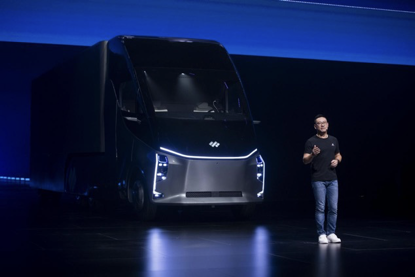On September 17th, 2021, DeepWay, a subsidiary of Baidu, held the “Driving towards the Intelligent D Era” first brand strategy conference in Beijing, officially launching its first intelligent heavy truck – Xingtu 1st generation. This is also the first official appearance since the establishment of Baidu Apollo ecosystem conference last year. The release of Xingtu 1st generation means that Baidu has also entered the trillion-dollar market of the main logistics and freight transportation field.
Wang Yunpeng, Baidu’s Vice President and General Manager of Autonomous Driving Technology Department, said at the conference that “to achieve commercial success in autonomous driving, advanced unmanned technology must be used to create a new species of ultimate product experience, and to create value in practical scenarios such as transportation, delivery, and lifestyle services. This new species is not a modified vehicle, but a car robot.”
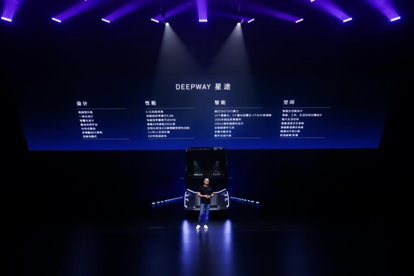
Forward-looking Research and Development
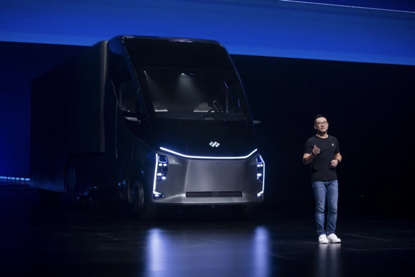
Xingtu 1st generation is an intelligent heavy truck developed through forward-looking research and development. It supports L3/L4 level intelligent driving and whole vehicle OTA upgrade function at the hardware level. DeepWay claims that Xingtu 1st generation will also be the first to implement L3 level assisted driving on high-speed main lines. L4 level automatic driving will be achieved within the next 3-5 years.
In the wind tunnel test by China Automotive Research Institute, the drag coefficient of Xingtu 1st generation is 0.35, which is 0.01 lower than that of Tesla Semi tractor. Such a low wind resistance means higher energy conversion rate of up to 94% with less energy consumption. The larger cargo space brought by forward-looking research and development is also one of the highlights of this truck. In fact, the cargo volume ratio has increased by 9.6%.
The customized 450-degree lithium iron phosphate battery pack can provide continuous range of 300 kilometers under the working condition of carrying 49 tons. It has faster energy replenishment efficiency, supports 1 hour 1C charging and energy replenishment, and is matched with a 6-minute high-speed swapping solution on the highway.
Native Intelligence
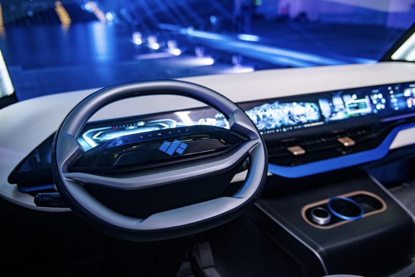
Xingtu 1st generation is equipped with HIS system based on Baidu’s autonomous driving technology research and development, and its AI computing power can be expanded to more than 500 TOPS. It is equipped with 10 cameras, 5 millimeter wave radars, and 3 infrared detectors. With the support of Baidu’s algorithm, it has ultra-long-range perception capability of more than 1,000 meters and end-to-end response speed of 100 milliseconds.## Baidu’s Involvement
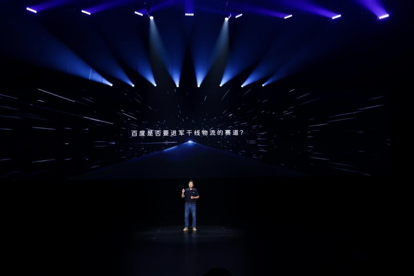
As for the intelligent life cabin, the concept of separating driving, work, and living spaces is adopted, which brings drivers a large living space, advanced intelligent voice interaction system, intelligent audiovisual entertainment system, touch-controlled central screen, and comfortable seats/berths, greatly improving the working environment and enhancing the professional experience.
As of the first half of 2021, Baidu’s autonomous driving travel service has served more than 400,000 passengers, with a test mileage of more than 14 million kilometers, and the number of test vehicles, test mileage, and safe mileage is among the best in the industry. Baidu, leveraging its leading autonomous driving technology capabilities, makes efforts in the intelligent freight field represented by Robotruck, which is also a natural horizontal expansion strategy.
Because the route is relatively fixed, unmanned logistics is considered a project that can be implemented faster than Robotaxi. In April of this year, TuSimple, co-founded by Jiao Tong University alumni, completed its NASDAQ IPO. On September 9th, WeRide, another Chinese autonomous driving company, unveiled its L4 Robovan model for urban freight logistics. Alibaba also announced this week that it is investing in Element AI to develop Robotaxi and Robovan services. The competitive pattern of the unmanned logistics track gradually emerging has aroused great expectations for what kind of practical products can be developed.
🔗Information source: DeepWay
This article is a translation by ChatGPT of a Chinese report from 42HOW. If you have any questions about it, please email bd@42how.com.
